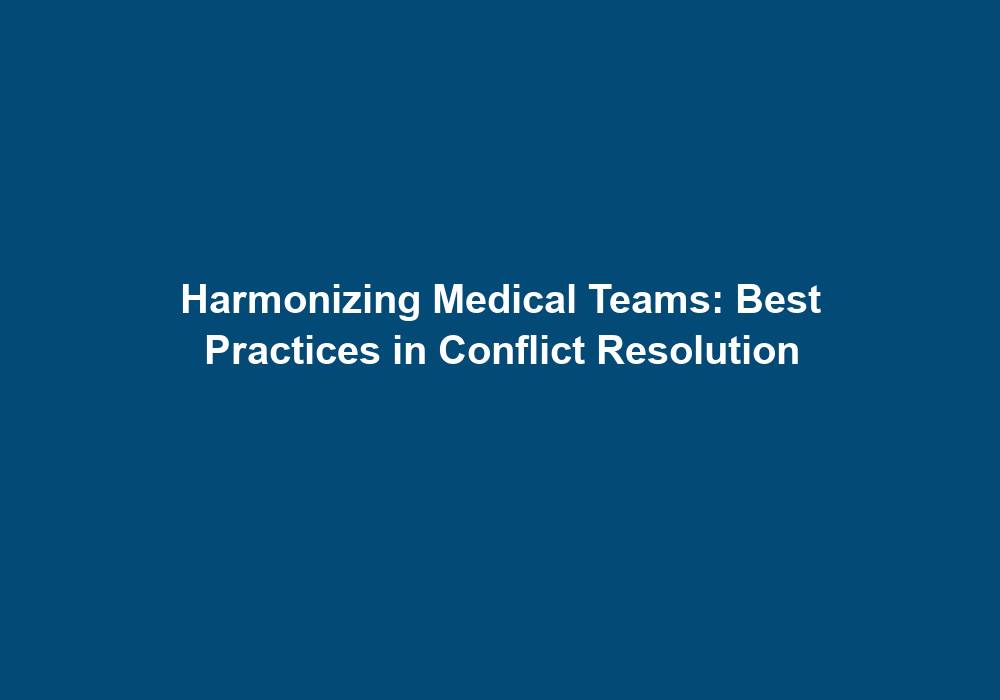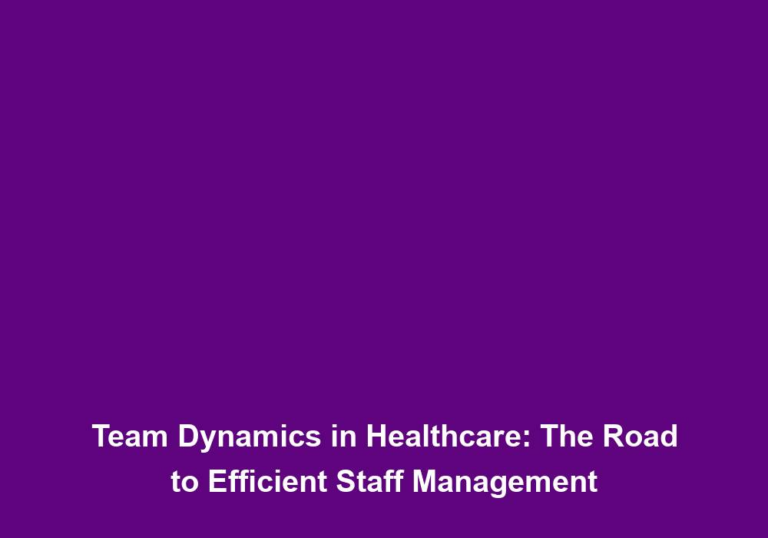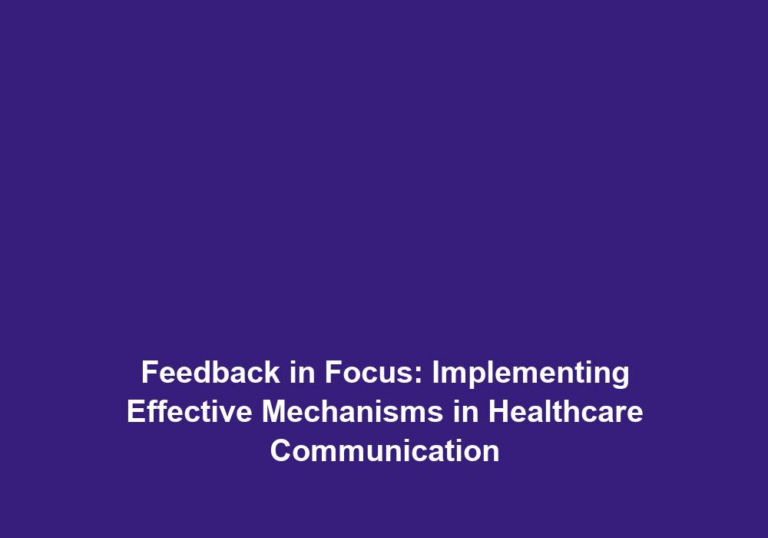Harmonizing Medical Teams: Best Practices in Conflict Resolution
Conflict is an inevitable part of any work environment, and medical teams are no exception. In a high-pressure setting where lives are at stake, conflicts can arise due to differences in opinions, personalities, or even communication styles. However, effective conflict resolution is crucial for ensuring the smooth functioning of a medical team and the provision of quality patient care. In this article, we will explore the best practices in conflict resolution that can help harmonize medical teams and foster a positive work environment.
Understanding the Nature of Conflict
Before delving into the best practices of conflict resolution, it is essential to understand the nature of conflicts that commonly occur within medical teams. These conflicts can be categorized into three broad types:
-
Task-related conflicts: Task-related conflicts arise when team members have differing opinions or ideas about patient treatment plans, diagnosis, or medical procedures. These conflicts often revolve around professional differences and can hinder the team’s ability to make timely decisions.
- It is important for medical teams to recognize that task-related conflicts can arise due to the diverse expertise and experience of team members. By acknowledging and respecting different perspectives, the team can leverage these conflicts as an opportunity for growth and innovation.
- Establishing clear guidelines and protocols for decision-making can help minimize task-related conflicts. By defining roles and responsibilities, and ensuring that all team members are aware of their specific areas of expertise, the team can work collaboratively towards a shared goal.
-
Interpersonal conflicts: Interpersonal conflicts occur due to differences in personalities, communication styles, or clashes of egos. These conflicts can lead to strained relationships, lack of trust, and poor collaboration among team members.
- Encouraging open and honest communication is key to addressing interpersonal conflicts. Team members should be encouraged to express their concerns and frustrations in a respectful and non-confrontational manner.
- Building strong relationships and fostering a culture of respect can help prevent interpersonal conflicts from escalating. By promoting a supportive and inclusive environment, team members are more likely to understand and appreciate each other’s differences.
-
Systemic conflicts: Systemic conflicts stem from broader organizational or systemic issues such as resource allocation, workload distribution, or conflicts between different departments within a healthcare facility. These conflicts can have a direct impact on the efficiency and morale of medical teams.
- To address systemic conflicts, it is important to identify and address the underlying issues within the organization. This may involve advocating for changes in policies, procedures, or resource allocation to ensure fairness and equity.
- Creating opportunities for cross-departmental collaboration and communication can help break down barriers and foster a sense of unity among team members. By promoting a shared vision and common goals, systemic conflicts can be minimized.
Best Practices for Conflict Resolution
To effectively address conflicts within medical teams and promote harmony, the following best practices can be implemented:
1. Promote Open and Constructive Communication
Open and constructive communication is the foundation for resolving conflicts within medical teams. Encourage team members to voice their concerns, opinions, and suggestions in a respectful and non-confrontational manner. Effective communication can help identify underlying issues, clarify misunderstandings, and reach mutually beneficial solutions.
- Actively listen to team members and provide them with the opportunity to express their thoughts and concerns. This not only helps in understanding different perspectives but also fosters trust and empathy.
- Establish regular team meetings or forums where team members can openly discuss and address conflicts. Encourage the use of effective communication techniques such as active listening, paraphrasing, and asking clarifying questions.
2. Foster a Culture of Collaboration and Respect
Creating a culture of collaboration and respect is vital for conflict resolution. Encourage team members to value each other’s expertise, perspectives, and contributions. Foster an environment where everyone feels heard, valued, and included in decision-making processes. This inclusive approach promotes teamwork and reduces the likelihood of conflicts arising from power dynamics or hierarchical structures.
- Encourage team members to actively seek out opportunities for collaboration and teamwork. This can be achieved through joint projects, cross-training, or shared decision-making processes.
- Recognize and appreciate the contributions of individual team members. Celebrate successes as a team and encourage a supportive and positive work environment.
3. Implement Mediation and Facilitation Techniques
Mediation and facilitation techniques can be employed to resolve conflicts between team members. A trained mediator or facilitator can help facilitate discussions, ensure fair and equal participation, and guide the team towards finding common ground. Mediation provides a neutral platform for team members to express their concerns, explore different viewpoints, and work towards mutually agreed-upon solutions.
- Identify individuals within the team who have strong mediation and facilitation skills. These individuals can act as neutral third parties to help resolve conflicts.
- Establish clear ground rules for mediation sessions, ensuring that all team members have an equal opportunity to voice their opinions and concerns. Encourage active participation and constructive dialogue.
4. Encourage Active Listening and Empathy
Active listening and empathy are essential skills for conflict resolution. Encourage team members to actively listen to each other, seeking to understand the underlying needs, concerns, and emotions of their colleagues. Empathy helps create a supportive environment where conflicts can be approached with compassion and understanding, fostering effective problem-solving and teamwork.
- Train team members in active listening techniques, such as maintaining eye contact, nodding to show understanding, and summarizing the speaker’s main points.
- Promote empathy by encouraging team members to put themselves in each other’s shoes. This can help foster understanding and promote a sense of shared responsibility.
5. Establish Clear Communication Channels and Processes
Establishing clear communication channels and processes is crucial for avoiding misunderstandings and conflicts. Implementing standardized protocols for sharing information, making decisions, and resolving conflicts ensures consistency and transparency within the team. Clearly define roles, responsibilities, and expectations, minimizing confusion and promoting efficient teamwork.
- Develop a communication plan that outlines the preferred methods of communication within the team. This may include face-to-face meetings, email, instant messaging, or project management tools.
- Clearly define roles and responsibilities for each team member, ensuring that everyone understands their specific areas of expertise and authority. This helps prevent conflicts arising from unclear expectations or overlapping responsibilities.
6. Provide Conflict Resolution Training
Training team members in conflict resolution skills can significantly contribute to harmonizing medical teams. Offer workshops or seminars focused on conflict resolution techniques, active listening, effective communication, and emotional intelligence. By providing team members with the necessary tools and knowledge, they can better navigate conflicts and contribute to a positive work environment.
- Collaborate with experts in conflict resolution to design and deliver training programs tailored to the specific needs of medical teams.
- Provide ongoing support and resources to reinforce conflict resolution skills learned during training sessions. This may include access to literature, online courses, or mentorship programs.
7. Encourage Continuous Feedback and Evaluation
Regularly seek feedback from team members regarding the conflict resolution processes and practices. Encourage open dialogue and suggestions for improvement. Evaluating the effectiveness of implemented strategies allows for ongoing refinement and adaptation, ensuring the long-term success of conflict resolution efforts.
- Conduct regular team assessments or surveys to gauge the team’s perception of conflict resolution within the group. Use this feedback to identify areas for improvement and implement necessary changes.
- Celebrate successes and recognize individuals or teams that have effectively resolved conflicts. This helps reinforce positive behaviors and encourages a culture of continuous improvement.
8. Seek Professional Support if Needed
In some cases, conflicts within medical teams may require professional intervention. If conflicts persist and hinder the team’s performance or jeopardize patient care, consider seeking the assistance of professional conflict resolution specialists or organizational development consultants. These experts can provide objective guidance, facilitate difficult conversations, and help identify systemic issues contributing to conflicts.
- Collaborate with professionals who specialize in conflict resolution within healthcare settings. They can provide insights and strategies tailored to the unique challenges faced by medical teams.
- Ensure confidentiality and trust when engaging external support. This encourages team members to be open and honest during the resolution process.
By implementing these best practices in conflict resolution, medical teams can foster a harmonious work environment, improve collaboration, and ultimately enhance patient care outcomes. Remember, conflicts are not always negative; when handled effectively, they can lead to growth, innovation, and improved team dynamics. Embracing conflict resolution as an integral part of the medical team’s culture enables the delivery of exceptional healthcare services.







